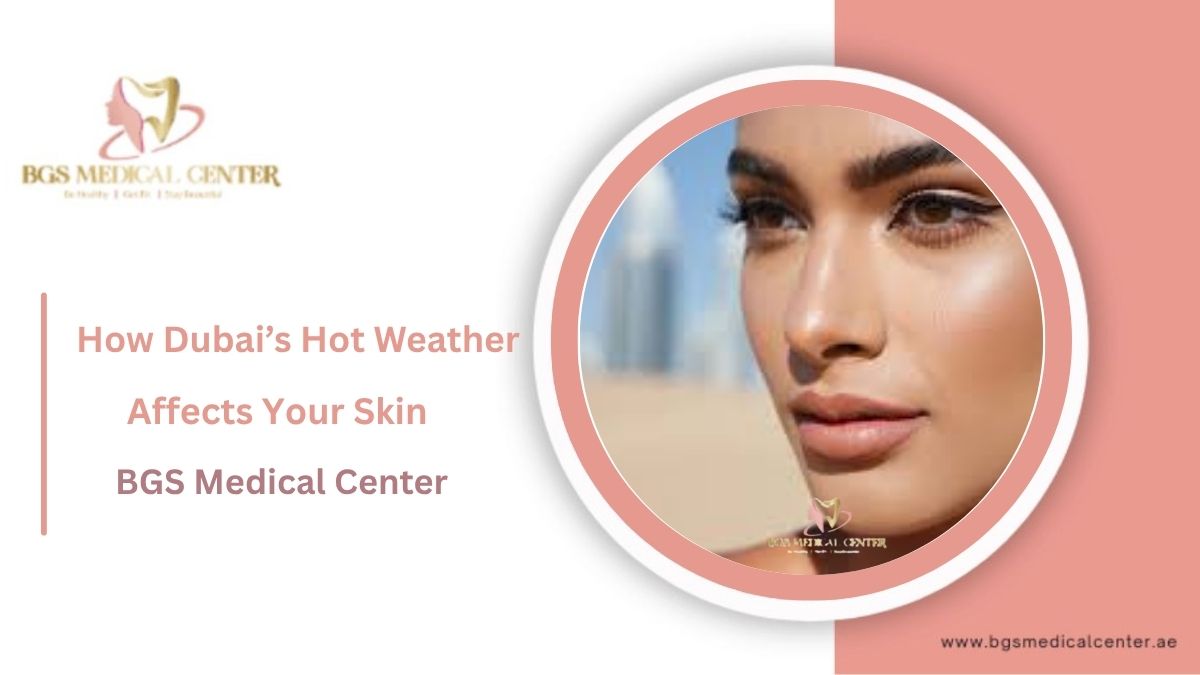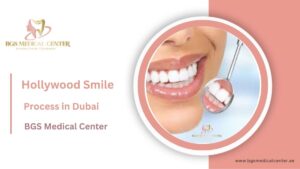Living in Dubai means dealing with year-round sunshine, heat, and humidity, conditions that can make even healthy skin feel unpredictable. One week your skin feels oily, the next it’s dry, itchy, or breaking out.
The good news? With the right medical guidance and a climate-specific skincare plan, you can protect your skin from Dubai’s harsh weather and keep it balanced all year long.
In this guide, we’ll explain how Dubai’s hot, humid weather affects your skin, the most common heat-induced acne breakouts, and how to build a dermatologist-approved skincare routine that works in the UAE climate.
Why Dubai’s Climate Impacts Skin Health Differently
Dubai’s weather is unique, high UV radiation, low rainfall, and long periods of heat combine to stress your skin in ways that aren’t common elsewhere.
Dermatologists describe three main stress factors:
- Intense sunlight: Causes sunburn, pigmentation, and premature aging.
- Humidity & sweating: Clogs pores and triggers acne.
- Indoor air-conditioning: Dries skin and disrupts the natural barrier.
This combination makes Dubai weather skin problems a year-round concern, especially for people with oily, sensitive, or combination skin. These patterns are explained in our environmental dermatology guide, which outlines how local climate factors affect skin health over time.
How Heat and Humidity Lead to Acne and Breakouts
Dubai’s hot weather increases sweat and sebum (oil) production. When sweat mixes with dirt, sunscreen, or makeup, it blocks pores, leading to heat-induced acne breakouts.
Dermatologists call this condition “acne mechanica”, acne caused by friction, sweat, and trapped bacteria.
Common triggers include:
- Wearing masks or helmets for long hours.
- Heavy skincare products in humid weather.
- Not cleansing properly after workouts or outdoor activity.
Prevention tips:
- Use lightweight, non-comedogenic moisturizers.
- Wash your face twice daily with a gentle cleanser.
- Avoid over-exfoliating, which can worsen oil imbalance.
If breakouts continue over time, a dermatology consultation in Dubai can help identify whether the cause is hormonal, bacterial, or related to other underlying skin factors.
Why Dryness and Sensitivity Worsen Indoors
While the outdoors are humid, most Dubai residents spend 80% of their time in air-conditioned spaces, which strip skin of moisture and natural oils.
This leads to:
- Flaky, tight skin on the face and hands.
- Increased sensitivity to skincare ingredients.
- Premature fine lines around the eyes and lips.
Dermatologist-approved fixes:
- Apply hyaluronic acid-based serums to restore hydration.
- Use fragrance-free, barrier-repair moisturizers.
- Add a humidifier to indoor spaces to balance dryness.
Consistent hydration helps prevent both irritation and the onset of eczema in humid climate conditions.
Can Dubai’s Sun Cause Long-Term Pigmentation?
Yes. Even a few minutes of unprotected sun exposure daily can increase melanin activity, leading to dark spots, tanning, and uneven tone.
The combination of heat and UV rays triggers post-inflammatory pigmentation, especially after acne or rashes.
Dermatologists recommend:
- Broad-spectrum SPF 50+ every morning, reapplied every 2–3 hours.
- Using antioxidants like Vitamin C or Niacinamide to neutralize free radicals.
- Wearing hats or scarves during mid-day hours (10 AM – 4 PM).
Learn how to treat existing pigmentation in our detailed post on hyperpigmentation vs melasma.
How to Protect Skin in Dubai’s Hot Climate – Step by Step
Your skin needs consistent care, not just reactive treatment, to stay healthy in the UAE’s extreme conditions.
Daily Climate-Proof Routine:
1. Morning: Cleanser + antioxidant serum + SPF 50+ sunscreen.
2. Midday: Reapply SPF and use blotting paper for oil control.
3. Evening: Gentle cleansing + lightweight moisturizer.
4. Weekly: Use mild exfoliation or dermatologist-recommended peel for renewal.
Medical Add-ons (for persistent issues):
- Laser treatments: Reduce sun damage and pigmentation safely.
- Hydrafacial or oxygen infusion: Deep cleanses and hydrates skin exposed to pollution.
- Customized peels: For dullness and rough texture.
Your dermatologist can recommend a climate-specific skin care, BGS plan tailored to your work, exposure, and skin type.
When to See a Dermatologist in Dubai’s Weather
You should schedule a consultation if you notice:
- Persistent redness, bumps, or acne that worsens with heat.
- Rough, itchy skin that doesn’t respond to moisturizers.
- Pigmentation or patchiness after sun exposure.
A DHA-licensed dermatologist can identify whether your concern is weather-induced or linked to other conditions, helping you prevent long-term damage.
FAQs:
Why does my skin get oily in Dubai’s weather?
The combination of heat and humidity increases sweat and sebum production. Lightweight, oil-free skincare helps balance it.
Can Dubai’s sun make pigmentation worse?
Yes. High UV levels trigger excess melanin. Consistent sun protection is key to prevention.
Is air conditioning bad for my skin?
Yes, prolonged exposure to cold, dry air removes natural moisture, leading to dryness and fine lines.
How can I prevent acne in hot weather?
Use non-comedogenic skincare, cleanse gently after sweating, and avoid heavy creams or makeup.
What’s the best moisturizer for Dubai’s climate?
Light gel-based or water-based moisturizers with ceramides and hyaluronic acid work best.
How often should I see a dermatologist in Dubai?
Ideally twice a year, or sooner if you notice breakouts, dryness, or pigmentation changes.
Does humidity help or harm the skin?
Moderate humidity helps retain moisture, but excess humidity can clog pores and worsen acne, balance is key.
Conclusion:
Dubai’s climate doesn’t have to mean constant skin problems. With preventive care and medical guidance, you can maintain clear, hydrated, and radiant skin year-round.
At BGS Medical Center, our dermatologists create customized climate-specific skin care BGS plans that address Dubai’s heat, humidity, and indoor dryness.
To start your personalized routine, schedule a dermatology consultation in Dubai today and protect your skin for the long term.
Disclaimer
This article is for educational purposes only and does not replace professional medical advice. All treatments must be performed by DHA-licensed dermatologists. For care, contact BGS Medical Center, Dubai.





